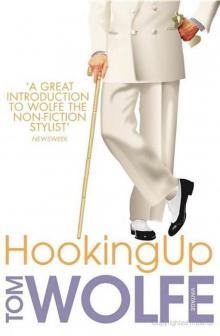The Bonfire of the Vanities Read online
Page 4
—and now she, forty years old, starved and Sports Trained to near-perfection, goes crying off to bed.
He slumped back in the swivel chair once more. Like many a man before him, he was no match, at last, for a woman’s tears. He hung his noble chin over his collarbone. He folded.
Absentmindedly he pressed a button on the desktop. The tambour door of a faux-Sheraton cabinet rolled back, revealing the screen of a television set. Another of his dear weeping decorator’s touches. He opened the desk drawer and took out the remote-control gadget and clicked the set to life. The news. The Mayor of New York. A stage. An angry crowd of black people. Harlem. A lot of thrashing about. A riot. The Mayor takes cover. Shouts…chaos…a real rhubarb. Absolutely pointless. To Sherman it had no more meaning than a gust of wind. He couldn’t concentrate on it. He clicked it off.
She was right. The Master of the Universe was cheap, and he was rotten, and he was a liar.
2. Gibraltar
The next morning, to Lawrence Kramer, she appears, from out of a feeble gray dawn, the girl with brown lipstick. She stands right beside him. He can’t make out her face, but he knows she’s the girl with brown lipstick. He can’t make out any of the words, either, the words that tumble like tiny pearls from between those lips with brown lipstick, and yet he knows what she’s saying. Stay with me, Larry. Lie down with me, Larry. He wants to! He wants to! He wants nothing more in this world! Then why doesn’t he? What holds him back from pressing his lips upon those lips with brown lipstick? His wife, that’s what. His wife, his wife, his wife, his wife, his wife—
He woke up to the pitch and roll of his wife crawling down to the foot of the bed. What a flabby, clumsy spectacle…The problem was that the bed, a queen-size resting on a plywood platform, was nearly the width of the room. So you had to crawl down or otherwise traverse the length of the mattress to reach the floor.
Now she was standing on the floor and bending over a chair to pick up her bathrobe. The way her flannel nightgown came down over her hips, she looked a mile wide. He immediately regretted thinking any such thought. He tingled with sentiment. My Rhoda! After all, she had given birth just three weeks ago. He was looking at the loins that had brought forth his first child. A son! She didn’t have her old shape back yet. He had to allow for that.
Still, that didn’t make the view any better.
He watched her wiggle into the bathrobe. She turned toward the doorway. A light came from the living room. No doubt the baby nurse, who was from England, Miss Efficiency, was already up and waxing efficient. In the light he could see his wife’s pale, puffy, undecorated face in profile.
Only twenty-nine, and already she looked just like her mother.
She was the same person all over again! She was her mother! No two ways about it! It was only a matter of time! She had the same reddish hair, the same freckles, the same chubby peasant nose and cheeks, even the beginning of her mother’s double chin. A yenta in embryo! Little Gretel of the shtetl! Young and yitzy on the Upper West Side!
He narrowed his eyelids to slits so that she wouldn’t know he was awake. Then she left the room. He could hear her saying something to the baby nurse and to the baby. She had a way of saying “Jo-shu-a” in baby cadence. That was a name he was already beginning to regret. If you wanted a Jewish name, what was wrong with Daniel or David or Jonathan? He pulled the covers back up over his shoulders. He would return to the sublime narcosis of sleep for another five or ten minutes. He would return to the girl with brown lipstick. He closed his eyes…It was no use. He couldn’t get her back. All he could think of was what the rush to the subway would be like if he didn’t get up now.
So he got up. He walked down the mattress. It was like trying to walk along the bottom of a rowboat, but he didn’t want to crawl. So flabby and clumsy…He was wearing a T-shirt and B.V.D. shorts. He became aware that he had that common affliction of young men, a morning erection. He went to the chair and put on his old plaid bathrobe. Both he and his wife had started wearing bathrobes since the English baby nurse had come into their lives. One of the apartment’s many tragic flaws was that there was no way of getting from the bedroom to the bathroom without going through the living room, where the nurse slept on the convertible couch and the baby resided in a crib beneath a music-box mobile hung with tiny stuffed clowns. He could hear it now. The music box played the tune “Send in the Clowns.” It played it over and over again. Plink plink plinkplink, plink plink plinkplink, plink PLINK plinkplink.
He looked down. The bathrobe did not do the trick. It looked as if there was a tent pole underneath it. But if he bent over, like this, it wasn’t noticeable. So he could walk through the living room and let the baby nurse see the tent pole, or he could walk through hunched over as if he had a back spasm. So he just stood where he was, in the gloom.
The gloom was right. The presence of the baby nurse had made him and Rhoda acutely aware of what a dump they lived in. This entire apartment, known as a 3½-room in New York real-estate parlance, had been created out of what had once been a pleasant but by no means huge bedroom on the third floor of a town house, with three windows overlooking the street. The so-called room he now stood in was really nothing more than a slot that had been created by inserting a plasterboard wall. The slot had one of the windows. What was left of the original room was now called a living room, and it had the other two windows. Back by the door to the hallway were two more slots, one for a kitchen two people couldn’t pass each other in, and the other for a bathroom. Neither had a window. The place was like one of those little ant colonies you can buy, but it cost them $888 a month, rent stabilized. If it hadn’t been for the rent-stabilization law, it would have cost probably $1,500, which would be out of the question. And they had been happy to find it! My God, there were college graduates his age, thirty-two, all over New York who were dying to find an apartment like this, a 3½, with a view, in a town house, with high ceilings, rent stabilized, in the West Seventies! Truly pathetic, wasn’t it? They could barely afford it when they were both working and their combined salaries had been $56,000 a year, $41,000 after deductions. The plan had been that Rhoda’s mother would give them the money as a sort of baby present to hire a baby nurse for four weeks, while Rhoda got back on her feet and went back to work. In the meantime, they would find an au pair girl to live in and look after the baby in return for room and board. Rhoda’s mother had come through with her part of the plan, but it was already obvious that this au pair girl who was willing to sleep on a convertible couch in the living room in an ant colony on the West Side did not exist. Rhoda would not be able to go back to work. They were going to have to get by on his $25,000-after-taxes, and the yearly rent here in this dump, even with the help of rent stabilization, was $10,656.
Well, at least these morbid considerations had restored his bathrobe to a decent shape. So he emerged from the bedroom.
“Good morning, Glenda,” he said.
“Oh, good morning, Mr. Kramer,” said the baby nurse.
Very cool and British, this voice of hers. Kramer was convinced he really couldn’t care less about British accents or the Brits themselves. In fact, they intimidated him, the Brits and their accents. In the baby nurse’s oh, a mere oh, he detected a whiff of Finally getting up, are you?
A plump, fiftyish woman, she was already efficiently turned out in her white uniform. Her hair was pulled back into a perfect bun. She had already closed up the convertible couch and put the cushions back in place, so that it had resumed its daytime mode as a dingy yellow, synthetic-linen-covered piece of parlor furniture. She sat on the edge of the thing, her back perfectly straight, drinking a cup of tea. The baby was lying on his back in his crib, perfectly content. Perfectly was the woman’s middle name. They had found her through the Gough Agency, which an article in the Home section of the Times had listed as one of the best and most fashionable. So they were paying the fashionable price of $525 a week for an English baby nurse. From time to time she mentioned other places whe
re she had worked. Always it was Park Avenue, Fifth Avenue, Sutton Place…Well, too bad! Now you’re getting an eyeful of a jack-legged walk-up on the West Side! They called her Glenda. She called them Mr. Kramer and Mrs. Kramer, instead of Larry and Rhoda. Everything was upside down. Glenda was the very picture of gentility, having tea, while Mr. Kramer, lord of the ant colony, came tramping through to the bathroom barefooted, bare-legged, tousle-headed, wearing a tattered old plaid bathrobe. Over in the corner, under an extremely dusty Dracaena fragrans plant, the TV set was on. A commercial flared to an end, and some smiling heads began talking on the Today show. But the sound was not on. She wouldn’t be so imperfect as to have the TV blaring. What on earth was she really thinking, this British arbiter sitting in judgment (on an appalling fold-out sofa) upon the squalor of chez Kramer?
As for the mistress of the household, Mrs. Kramer, she was just emerging from the bathroom, still in her bathrobe and slippers.
“Larry,” she said, “look at my fuh-head. I think theh’s something theh, like a rash. I sawr it in the mirror.”
Still foggy, Kramer tried to look at her fuh-head.
“It’s nothing, Rhoda. It’s like the beginning of a pimple.”
That was another thing. Since the baby nurse had arrived, Kramer had also become acutely aware of the way his wife talked. He had never noticed it before, or hardly. She was a graduate of New York University. For the past four years she had been an editor at Waverly Place Books. She was an intellectual, or at least she seemed to be reading a lot of the poetry of John Ashbery and Gary Snyder when he first met her, and she had a lot to say about South Africa and Nicaragua. Nevertheless, a forehead was a fuh-head, and there had no r at the end, but saw did.
That was like her mother, too.
Rhoda padded on by, and Kramer entered the bathroom slot. The bathroom was pure Tenement Life. There was laundry hanging all along the shower curtain rod. There was more laundry on a line that ran diagonally across the room, a baby’s zip-up suit, two baby bibs, some bikini panties, several pairs of panty hose, and God knew what else, none of it the baby nurse’s, of course. Kramer had to duck down to get to the toilet. A wet pair of panty hose slithered over his ear. It was revolting. There was a wet towel on the toilet seat. He looked around for some place to hang it. There was no place. He threw it on the floor.
After urinating, he moved twelve or fourteen inches to the sink and took off his bathrobe and his T-shirt and draped them over the toilet seat. Kramer liked to survey his face and his build in the mornings. What with his wide, flat features, his blunt nose, his big neck, nobody ever took him for Jewish at first. He might be Greek, Slavic, Italian, even Irish—in any event, something tough. He wasn’t happy that he was balding on top, but in a way that made him look tough, too. He was balding the way a lot of professional football players were balding. And his build…But this morning he lost heart. Those powerful deltoids, those massive sloping trapezii, those tightly bunched pectorals, those curving slabs of meat, his biceps—they looked deflated. He was fucking atrophying! He hadn’t been able to work out since the baby and the baby nurse arrived. He kept his weights in a carton behind the tub that held the dracaena plant, and he worked out between the plant and the couch—and there was no way in the world he could work out, could grunt and groan and strain and ventilate and take appreciative looks at himself in the mirror in front of the English baby nurse…or the mythical au pair girl of the future, for that matter…Let’s face it! It’s time to give up those childish dreams! You’re an American workadaddy now! Nothing more.
When he left the bathroom, he found Rhoda sitting on the couch next to the English baby nurse, and both of them had their eyes pinned on the TV set, and the sound was up. It was the news segment of the Today show.
Rhoda looked up and said excitedly: “Look at this, Larry! It’s the Mayor! There was a riot in Harlem last night. Someone threw a bottle at him!”
Kramer only barely noticed that she said meh-uh for mayor and boh-uhl for bottle. Astonishing things were happening on the screen. A stage—a melee—heaving bodies—and then a huge hand filled the screen and blotted out everything for an instant. More screams and grimaces and thrashing about, and then pure vertigo. To Kramer and Rhoda and the baby nurse it was as if the rioters were breaking through the screen and jumping onto the floor right beside little Joshua’s crib. And this was the Today show, not the local news. This was what America was having for breakfast this morning, a snootful of the people of Harlem rising up in their righteous wrath and driving the white Mayor off the stage in a public hall. There goes the back of his head right there, burrowing for cover. Once he was the Mayor of New York City. Now he is the Mayor of White New York.
When it was over, the three of them looked at one another, and Glenda, the English baby nurse, spoke up, with considerable agitation.
“Well, I think that’s perfectly disgusting. The colored don’t know how good they’ve got it in this country, I can tell you that much. In Britain there’s not so much as a colored in a police uniform, much less an important public official, the way they have here. Why, there was an article just the other day. There’s more than two hundred coloreds who are mayors in this country. And they want to bash the Mayor of New York about. Some people don’t know how well off they are, if you ask me.”
She shook her head angrily.
Kramer and his wife looked at each other. He could tell she was thinking the same thing he was.
Thank God in heaven! What a relief! They could let their breaths out now. Miss Efficiency was a bigot. These days the thing about bigotry was, it was undignified. It was a sign of Low Rent origins, of inferior social status, of poor taste. So they were the superiors of their English baby nurse, after all. What a fucking relief.
The rain had just about stopped when Kramer started walking to the subway. He was wearing an old raincoat over his usual gray suit, button-down shirt, and necktie. He had on a pair of Nike running shoes, white with stripes on the sides. He carried his brown leather dress shoes in a shopping bag, one of those slippery white plastic bags you get at the A&P.
The subway stop where he could catch the D train to the Bronx was at Eighty-first Street and Central Park West. He liked to walk across to Central Park West on Seventy-seventh Street and then walk up to Eighty-first, because that took him past the Museum of Natural History. It was a beautiful block, the most beautiful block on the West Side, to Kramer’s way of thinking, like a street scene in Paris; not that he had ever been to Paris. Seventy-seventh Street was very wide at that point. On one side was the museum, a marvelous Romanesque Revival creation in an old reddish stone. It was set back in a little park with trees. Even on a cloudy day like this the young spring leaves seemed to glow. Verdant was the word that crossed his mind. On this side of the street, where he was walking, was a cliff of elegant apartment houses overlooking the museum. There were doormen. He got glimpses of marbled halls. And then he thought of the girl with brown lipstick…He could see her very clearly now, much more clearly than in the dream. He clenched his fist. Damn it! He was going to do it! He was going to call her. He was going to make that telephone call. He’d have to wait until the end of the trial, of course. But he was going to do it. He was tired of watching other people lead… The Life. The girl with brown lipstick!—the two of them, looking into each other’s eyes across a table in one of those restaurants with blond wood and exposed brick and hanging plants and brass and etched glass and menus with crayfish Natchez and veal and plantains mesquite and cornbread with cayenne pepper!
Kramer had that vision comfortably in place when just up ahead, from the swell-looking doorway of 44 West Seventy-seventh Street emerged a figure that startled him.
It was a young man, almost babyish in appearance, with a round face and dark hair, neatly combed back. He was wearing a covert-cloth Chesterfield topcoat with a golden brown velvet collar and carrying one of those burgundy leather attaché cases that come from Mädler or T. Anthony on Park Avenue and have a
buttery smoothness that announces: “I cost $500.” You could see part of the uniformed arm that held the door open for him. He was walking with brisk little steps under the canopy, across the sidewalk, toward an Audi sedan. There was a driver in the front seat. There was a number—271—in the rear side window; a private car service. And now the doorman was hurrying out, and the young man paused to let him catch up and open the sedan’s rear door.
And this young man was…Andy Heller! No doubt about it whatsoever. He had been in Kramer’s class at Columbia Law School—and how superior Kramer had felt when Andy, chubby bright little Andy, had done the usual thing, namely, gone to work Downtown, for Angstrom & Molner. Andy and hundreds like him would spend the next five or ten years humped over their desks checking commas, document citations, and block phrases to zip up and fortify the greed of mortgage brokers, health-and-beauty-aid manufacturers, merger-and-acquisition arbitragers, and re-insurance discounters—while he, Kramer, would embrace life and wade up to his hips into the lives of the miserable and the damned and stand up on his feet in the courtrooms and fight, mano a mano, before the bar of justice.
And that was the way it had, in fact, turned out. Why, then, did Kramer now hold back? Why didn’t he march right up and sing out, “Hi, Andy”? He was no more than twenty feet from his old classmate. Instead, he stopped and turned his head toward the front of the building and put his hand to his face, as if he had something in his eye. He was damned if he felt like having Andy Heller—while his doorman held his car door open for him and his driver waited for the signal to depart—he was damned if he felt like having Andy Heller look him in the face and say, “Larry Kramer, how you doing!” and then, “What you doing?” And he would have to say, “Well, I’m an assistant district attorney up in the Bronx.” He wouldn’t even have to add, “Making $36,000 a year.” That was common knowledge. All the while, Andy Heller would be scanning his dirty raincoat, his old gray suit, which was too short in the pants, his Nike sneakers, his A&P shopping bag…Fuck that…Kramer stood there with his head turned, faking a piece of grit in his eye, until he heard the door of the Audi shut. It sounded like a safe closing. He turned around just in time to catch a nice fluffy little cloud of German luxury-auto fumes in his face as Andy Heller departed for his office. Kramer didn’t even want to think about what the goddamned place probably looked like.

 Back to Blood
Back to Blood The Painted Word
The Painted Word The Right Stuff
The Right Stuff Hooking Up
Hooking Up The Kingdom of Speech
The Kingdom of Speech The Bonfire of the Vanities
The Bonfire of the Vanities The Electric Kool-Aid Acid Test
The Electric Kool-Aid Acid Test The Kandy-Kolored Tangerine-Flake Streamline Baby
The Kandy-Kolored Tangerine-Flake Streamline Baby The Purple Decades - a Reader
The Purple Decades - a Reader Back to Blood: A Novel
Back to Blood: A Novel The Purple Decades
The Purple Decades